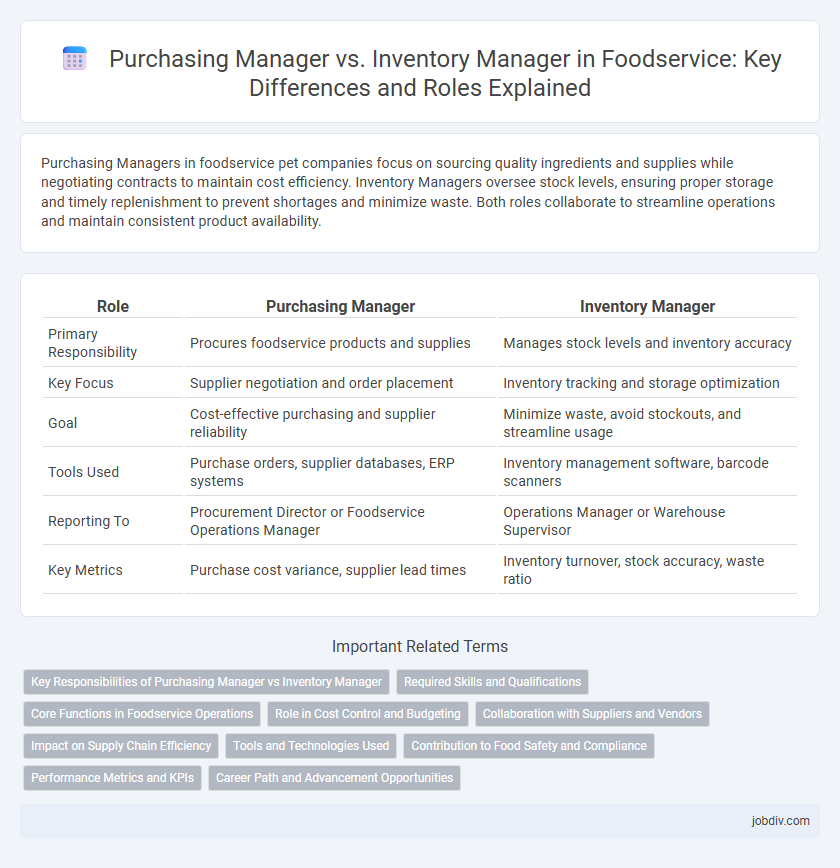Purchasing Managers in foodservice pet companies focus on sourcing quality ingredients and supplies while negotiating contracts to maintain cost efficiency. Inventory Managers oversee stock levels, ensuring proper storage and timely replenishment to prevent shortages and minimize waste. Both roles collaborate to streamline operations and maintain consistent product availability.
Table of Comparison
| Role | Purchasing Manager | Inventory Manager |
|---|---|---|
| Primary Responsibility | Procures foodservice products and supplies | Manages stock levels and inventory accuracy |
| Key Focus | Supplier negotiation and order placement | Inventory tracking and storage optimization |
| Goal | Cost-effective purchasing and supplier reliability | Minimize waste, avoid stockouts, and streamline usage |
| Tools Used | Purchase orders, supplier databases, ERP systems | Inventory management software, barcode scanners |
| Reporting To | Procurement Director or Foodservice Operations Manager | Operations Manager or Warehouse Supervisor |
| Key Metrics | Purchase cost variance, supplier lead times | Inventory turnover, stock accuracy, waste ratio |
Key Responsibilities of Purchasing Manager vs Inventory Manager
The Purchasing Manager oversees supplier negotiations, order placement, and cost management to ensure timely procurement of quality foodservice products. The Inventory Manager is responsible for tracking stock levels, conducting regular audits, and managing storage to prevent waste and shortages. Both roles collaborate to balance supply chain efficiency and operational continuity in foodservice establishments.
Required Skills and Qualifications
Purchasing Managers in foodservice require strong negotiation skills, vendor relationship management, and expertise in cost analysis to ensure optimal supply procurement. Inventory Managers must excel in inventory control, data analysis, and forecasting to maintain accurate stock levels and minimize waste. Both roles benefit from proficiency in supply chain management software and a deep understanding of food safety regulations.
Core Functions in Foodservice Operations
Purchasing Managers in foodservice operations primarily focus on sourcing quality ingredients, negotiating supplier contracts, and ensuring cost-effective procurement to maintain menu standards and budget targets. Inventory Managers oversee stock levels, control waste, and implement inventory tracking systems to prevent shortages and spoilage, ensuring smooth kitchen workflows. Both roles are critical for operational efficiency, but Purchasing Managers drive supplier relationships and cost management, while Inventory Managers emphasize inventory accuracy and supply chain continuity.
Role in Cost Control and Budgeting
The Purchasing Manager in foodservice plays a critical role in cost control by negotiating supplier contracts and securing bulk discounts to optimize budget allocations. The Inventory Manager focuses on minimizing waste and ensuring accurate stock levels, directly impacting operational costs and preventing budget overruns. Together, their coordinated efforts enhance overall financial efficiency and maintain strict adherence to the foodservice budget.
Collaboration with Suppliers and Vendors
Purchasing Managers strategically negotiate contracts and secure favorable terms with suppliers to ensure cost-effective procurement and product quality. Inventory Managers collaborate closely with vendors to monitor stock levels, streamline deliveries, and prevent shortages or overstocking. Effective communication between these roles enhances supplier relationships, optimizes supply chain efficiency, and supports consistent foodservice operations.
Impact on Supply Chain Efficiency
Purchasing Managers directly influence supply chain efficiency by negotiating costs, securing reliable suppliers, and managing purchase orders to ensure product availability in the foodservice industry. Inventory Managers optimize stock levels by tracking consumption patterns and minimizing waste, reducing holding costs and preventing stockouts or overstock situations. Together, their coordination improves order accuracy, lead times, and overall supply chain responsiveness, enhancing operational continuity in foodservice establishments.
Tools and Technologies Used
Purchasing Managers in foodservice rely on procurement software and supplier management platforms to streamline order processing and maintain cost control, often using ERP systems for integrated purchasing workflows. Inventory Managers utilize inventory management tools, barcode scanners, and real-time stock tracking software to monitor supplies, reduce waste, and optimize stock levels efficiently. Both roles benefit from cloud-based analytics and mobile applications that enhance data accuracy and operational responsiveness in dynamic foodservice environments.
Contribution to Food Safety and Compliance
Purchasing Managers ensure food safety by selecting reputable suppliers that meet regulatory standards and conducting thorough quality audits to prevent contamination risks. Inventory Managers focus on maintaining proper storage conditions, monitoring expiration dates, and implementing first-in, first-out (FIFO) systems to minimize spoilage and ensure compliance with health regulations. Both roles collaborate to uphold stringent food safety protocols, ensuring consistent compliance with industry standards and preventing foodborne illnesses.
Performance Metrics and KPIs
Purchasing Managers in foodservice focus on KPIs such as cost savings, supplier lead times, and order accuracy to optimize procurement efficiency and reduce expenses. Inventory Managers prioritize performance metrics like inventory turnover rate, stock accuracy, and waste reduction to maintain optimal stock levels and minimize food spoilage. Both roles use data-driven insights to enhance overall supply chain performance and support operational profitability.
Career Path and Advancement Opportunities
Purchasing Managers in foodservice typically advance by gaining expertise in supplier negotiations and cost management, often moving into senior procurement or supply chain director roles. Inventory Managers tend to progress by mastering inventory control systems and demand forecasting, positioning themselves for roles such as operations manager or logistics director. Career advancement for both roles depends on experience in optimizing foodservice supply chains, data analysis proficiency, and leadership skills.
Purchasing Manager vs Inventory Manager Infographic

 jobdiv.com
jobdiv.com